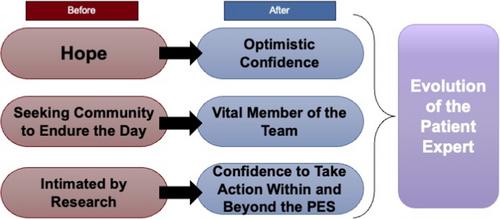Through Their Eyes: Using Photovoice to Capture the Capacity-Building Journey of Long Covid Patient Experts
Abstract
Background
Long Covid, characterised by persistent symptoms following the coronavirus disease 2019 (COVID-19) infection, significantly impacts the quality of life. Engaging patients in research and care through participatory methods can enhance a shared understanding of illness and improve the relevance of research.
Objective
We define Patient Experts (PEs) as persons (including patients, caregivers and providers) who have completed a series of training sessions on team building, research methods and communication at the Patient Engagement Studio, University of South Carolina (PES USC). This study explores the use of photovoice to document the experiences and capacity-building journey of Long Covid PEs within PES USC.
Methods
The study employed photovoice within the COVID-19-Focused Virtual Patient Engagement Studio (CoVIP Studio). PEs submitted photographs and narratives at two distinct time points. Among the 18 PEs who participated in the project, 47 photos were collected during the training, and 31 were collected at the project's conclusion. Thematic analysis was conducted to capture changes in patient perspectives and engagement.
Results
Initial themes identified were “Hope through Community,” “Collaborative Education and Research” and “Strength and Endurance.” By the project's end, themes had evolved to “Working as a Team to Share and Acquire Knowledge,” “Enhanced Confidence in the Future of Care” and “Perseverance and Progress.” These findings highlight the transformative impact of patient engagement and the utility of photovoice in documenting longitudinal shifts in patient perspectives.
Conclusion
Photovoice effectively engaged Long Covid patients and captured their evolving roles and perceptions as PEs. The study underscores the value of patient-led participatory methods in enhancing the relevance and applicability of clinical research, advocating for their broader adoption to improve patient-centred care and research outcomes.
Patient or Public Contribution
A CoVIP Studio stakeholder advisory board (CoVIP SAB) guided the co-development and implementation of this project. The CoVIP SAB comprised nine members with complementary skills and expertise, including three patients, three clinicians who provide care to patients with COVID-19 and three researchers with expertise in patient-centred research, COVID-19 and/or patient engagement and collaborate with patients as co-investigators. The board contributed to project design and implementation, refining photovoice prompts and shaping dissemination strategies. In addition, one PE who actively participated in all phases of the project contributed to the writing of this paper and is a coauthor. All project activities involved patients and/or caregivers with lived experience of Long Covid.


 求助内容:
求助内容: 应助结果提醒方式:
应助结果提醒方式:


